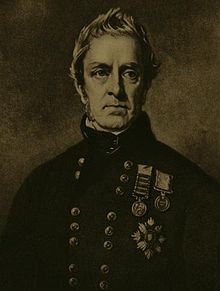Sir George Pollock, 1st Baronet
| Sir George Pollock, Bt | |
|---|---|

Sir George Pollock
|
|
| Born | 4 June 1786 Piccadilly, London |
| Died | 6 October 1872 (aged 86) Walmer, Kent |
| Allegiance |
|
| Service/branch |
|
| Years of service | 1801–1846 |
| Rank | Field Marshal |
| Battles/wars |
Second Anglo-Maratha War Anglo-Nepalese War First Anglo-Burmese War First Anglo-Afghan War |
| Awards |
Knight Grand Cross of the Order of the Bath Knight Grand Commander of the Order of the Star of India |
| Relations | Sir Frederick Pollock, 1st Baronet (brother) |
| Other work | Constable of the Tower |
Field Marshal Sir George Pollock, 1st Baronet GCB GCSI (4 June 1786 – 6 October 1872) was a British Indian Army officer. He first saw action at the Battle of Deeg and at the Siege of Bhurtpore during the Second Anglo-Maratha War before taking part in the Anglo-Nepalese War. He also commanded the British artillery at the Battle of Prome and at Bagan during the First Anglo-Burmese War. Following a disastrous retreat from Kabul in January 1842 during the First Anglo-Afghan War, the retreating forces became stranded at the small British garrison at Jalalabad and Pollock was appointed Commander of the Force sent to relieve the garrison: he advanced through the Khyber Pass and relieved the garrison in April 1842. He then set about an unauthorised but ultimately successful mission to rescue the British hostages who had been left behind in Kabul prior to the retreat. In 1844 the Pollock Medal was created to commemorate Pollock's achievements: this medal was to be awarded to the "best cadet of the season" at the Addiscombe Military Seminary.
Born the son of David Pollock (a saddler) and Sarah Pollock (née Parsons) and educated at the Royal Military Academy, Woolwich, Pollock was commissioned as a lieutenant-fireworker in the Bengal Artillery on 14 December 1803. Promoted to lieutenant on 19 April 1804, he saw action at the Battle of Deeg in November 1804 and at the Siege of Bhurtpore in Spring 1805 during the Second Anglo-Maratha War. Promoted to captain lieutenant on 17 September 1805 and to captain on 12 March 1812, he served in the Anglo-Nepalese War before being promoted to major on 12 August 1819. He became assistant adjutant-general of artillery in 1820 and being promoted to lieutenant colonel on 1 May 1824.
...
Wikipedia
